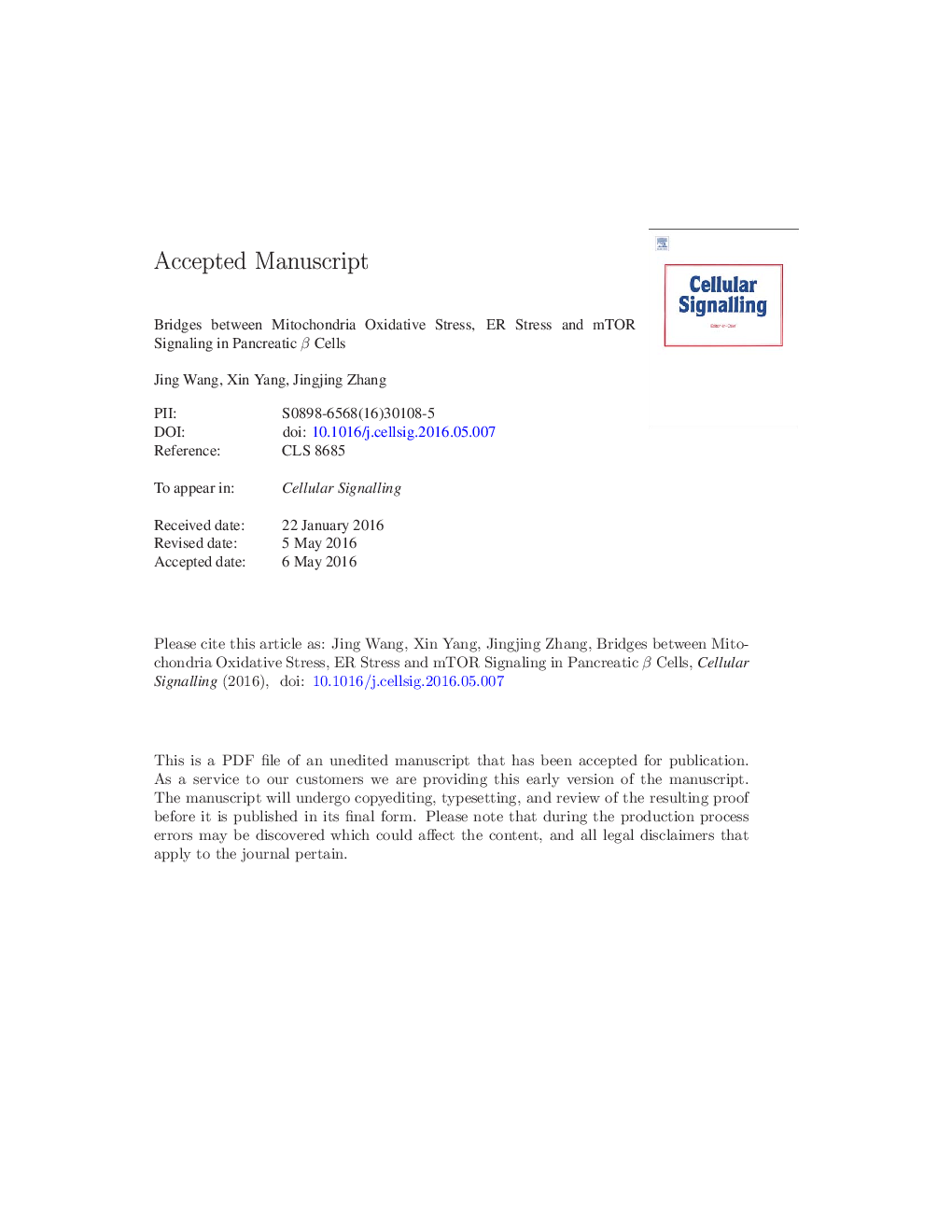| Article ID | Journal | Published Year | Pages | File Type |
|---|---|---|---|---|
| 10815857 | Cellular Signalling | 2016 | 23 Pages |
Abstract
Pancreatic β cell dysfunction, i.e., failure to provide insulin in concentrations sufficient to control blood sugar, is central to the etiology of all types of diabetes. Current evidence implicates mitochondrial oxidative stress and endoplasmic reticulum (ER) stress in pancreatic β cell loss and impaired insulin secretion. Oxidative and ER stress are interconnected so that misfolded proteins induce reactive oxygen species (ROS) production; likewise, oxidative stress disturbs the ER redox state thereby disrupting correct disulfide bond formation and proper protein folding. mTOR signaling regulates many metabolic processes including protein synthesis, cell growth, survival and proliferation. Oxidative stress inhibits mTORC1, which is considered an important suppressor of mitochondrial oxidative stress in β cells, and ultimately, controls cell survival. The interplay between ER stress and mTORC1 is complicated, since the unfolded protein response (UPR) activation can occur upstream or downstream of mTORC1. Persistent activation of mTORC1 initiates protein synthesis and UPR activation, while in the later phase induces ER stress. Chronic activation of ER stress inhibits Akt/mTORC1 pathway, while under particular settings, acute activation of UPR activates Akt-mTOR signaling. Thus, modulating mitochondrial oxidative stress and ER stress via mTOR signaling may be an approach that will effectively suppress obesity- or glucolipotoxicity-induced metabolic disorders such as insulin resistance and type 2 diabetes mellitus (T2DM). In this review, we focus on the regulations between mTOR signaling and mitochondrial oxidative or ER stress in pancreatic β cells.
Keywords
mTORC2eIF2αATF6CIICIIIGRP78AMPKmTORC1Irs24E binding proteinIRS1CIVGSIS4E-BP13O2mSIN1mTOR complex 2Redd1PRAS40mLST8OH·protein kinase R-like endoplasmic reticulum kinaseDEP domain containing mTOR-interacting proteinGβLERO1αPDIIRE1CATERADGPXOXPHOSmTORFOXO1NOSPI3KAMP-activated protein kinasemTOR complex 1Hydrogen peroxideAdenosine TriphosphateATPinositol-requiring enzyme 1superoxide anionMitochondrial Deoxyribonucleic acidNADPH oxidaseInsulin receptor substrate 2ER-Associated DegradationGlucose-stimulated insulin secretionForkhead box O1mtDNAHydroxyl radicalRaptorRictorinsulin receptor substrate 1endoplasmic reticulumeukaryotic initiation factor 2αOxidative phosphorylationactivating transcription factor 6Complex IVComplex VComplex IInitric oxide synthasenicotinamide adenine dinucleotide phosphate-oxidaseH2O2regulatory-associated protein of mTORPERKcomplex IIICatalaseDEPTOR
Related Topics
Life Sciences
Biochemistry, Genetics and Molecular Biology
Biochemistry
Authors
Jing Wang, Xin Yang, Jingjing Zhang,
